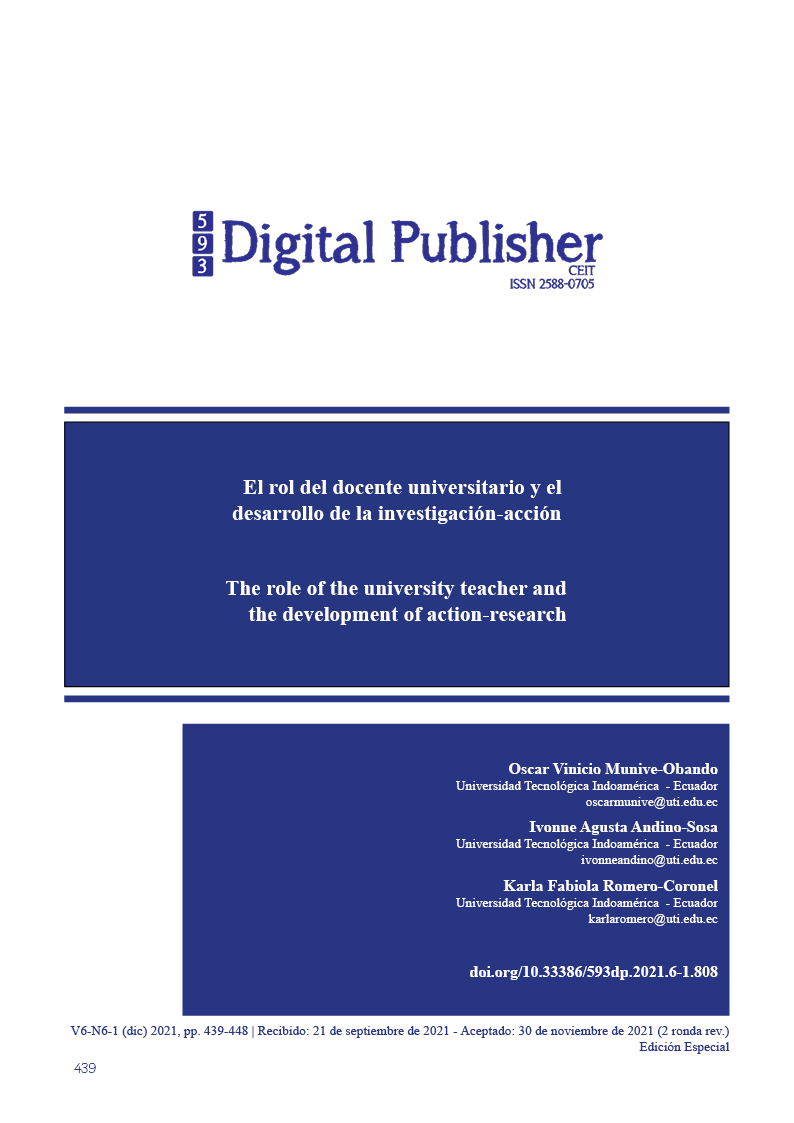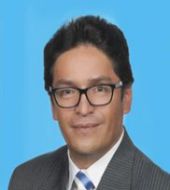El rol del docente universitario y el desarrollo de la investigación-acción
Contenido principal del artículo
Resumen
La aplicabilidad de la investigación-acción en la educación tiene una variedad de facetas que alimentan los varios campos, disciplinas de manera permanente con el fin de generar estrategias para buscar solucionar y plantear mejoras. La educación superior genera líneas de investigación en sus diversas carreras, pero no se ha podido sistematizar, no hay una estructura investigativa que genere la interrelación funcional entre los elementos que producen la problemática educativa. El presente artículo tiene como objetivo analizar la utilización de la investigación-acción en el campo de la práctica docente, desde los diversos enfoques y perspectivas que permita fortificar el desarrollo del docente en base a experiencias, para ello se pretende realizar una revisión bibliográfica sobre la investigación acción en el contexto educativo, implementando la metodología de carácter cualitativo que deriva en el tipo Bibliográfico – Documental. En los resultados obtenidos se resalta la importancia de introducir la investigación-acción en el desarrollo profesional docente para cambiar su práctica, la comprensión y condiciones de la misma, por su parte los docentes con amplia experiencia poseen el dominio pedagógico, y de las temáticas de los contenidos curriculares, para lo cual, desarrollan una amplia gama de actividades que pueden ser seleccionadas en el acto de enseñanza - aprendizaje, mientras que los profesores en formación experimentan muchas dificultades en la planificación. La investigación significa un verdadero aprendizaje para todos: directivos, docentes y estudiantes siendo estos últimos los miembros más importantes de este proceso.
Descargas
Detalles del artículo

Esta obra está bajo una licencia internacional Creative Commons Atribución-NoComercial-CompartirIgual 4.0.
1. Derechos de autor
Las obras que se publican en 593 Digital Publisher CEIT están sujetas a los siguientes términos:
1.1. 593 Digital Publisher CEIT, conserva los derechos patrimoniales (copyright) de las obras publicadas, favorece y permite la reutilización de las mismas bajo la licencia Licencia Creative Commons 4.0 de Reconocimiento-NoComercial-CompartirIgual 4.0, por lo cual se pueden copiar, usar, difundir, transmitir y exponer públicamente, siempre que:
1.1.a. Se cite la autoría y fuente original de su publicación (revista, editorial, URL).
1.1.b. No se usen para fines comerciales u onerosos.
1.1.c. Se mencione la existencia y especificaciones de esta licencia de uso.
Citas
Alfaro, A. & Piñeiro, M. (2015). La práctica docente supervisada: proceso caórdico. InterSedes: Revista de las Sedes Regionales, XVI (33), 53-70. ISSN: 2215-2458. Disponible en: https://www.redalyc.org/articulo.oa?id=66638602004
Ander-Egg, E. (2003). Repensando la investigación acción participativa. Colección Política y servicio social. https://abacoenred.com/wp-content/uploads/2017/05/Repensando-la-IAP-2003-Ed.4-Ander-Egg-Ezequiel.pdf.pdf
Balcázar, F. E. (2003). Investigación acción participativa (iap): Aspectos conceptuales y dificultades de implementación. Fundamentos en humanidades, 7-8, 59-77. Dialnet. https://dialnet.unirioja.es/servlet/articulo?codigo=1272956
Christina, V., Bergendahl, B. Action research as a means of professional development: Reflections on research and action in university chemistry education (2003) Journal of In-Service Education, 29 (3), 363-374.
Delfino, D. Ruiz, M, Sierra N. (2015). Investigación de la práctica docente. KAIROS. Revista de temas sociales Año 19 no. 36. (noviembre 2015). Villa Mercedes: Universidad Nacional de San Luis.
Elliot, John (2005). El cambio educativo desde la investigación acción. Ediciones Morata S.L. Cuarta Edición. Madrid-España
Freire, P. (2005). Pedagogía del oprimido. Ciudad de México: Siglo XXI.
Hernández R., Fernández, C., & Baptista, P. (2014). Metodología de la investigación: (6a. ed. --.). México D.F.: McGraw-Hill.
Hervás-Torres, Mirian. (2020). El entorno wiki y su aplicación didáctica innovadora. RED. Revista de Educación a Distancia. Núm. 62, Vol. 20. Artículo. 03, 31-03-2020DOI: http://dx.doi.org/10.6018/red.404161.
John, PD 2006. "Planificación de la lección y el profesor: repensar el modelo dominante". Revista de estudios curriculares 38 (4): 483–498. doi:10.1080 / 00220270500363620.
Kemmis, S. 2009. "Investigación-acción como práctica basada en la práctica". Investigación de acción educativa 17 (3): 463–474. doi:10.1080 / 09650790903093284.
Ledezma Campos, Miguel Ángel; Reyes Lamothe, Eric & Caporal Gaytán, Julia Magdalena (2018).
Malose Kola (2019): Investigación de acción de profesores en formación: planificación de lecciones de educación tecnológica en una universidad de Sudáfrica, Educational Action Research, DOI: 10.1080 / 09650792.2019.1686043
Margolis, J., R. Durbin y A. Doring. 2017. "El eslabón perdido en el desarrollo profesional docente: la presencia de los estudiantes". Desarrollo profesional en educación 43 (1): 23–35. doi:10.1080 / 19415257.2016.1146995.
Moore, J. (2005). ¿Está la educación superior preparada para el aprendizaje transformador? Una pregunta explorada en el estudio de la sostenibilidad. Revista de educación transformadora, 3 (1), 76–91.
Quintão Carneiro, Vânia (2008). Lecturas propositivas de TV y creación de guiones dibujados por adolescentes. Comunicar, nº 31, v. XVI, 2008, Revista Científica de Educomunicación; ISSN: 1134-3478; páginas 375-380.
Rodríguez, E. (2016). La investigación–acción como instrumento de evaluación de la propia práctica docente. IE Revista de Investigación Educativa de la REDIECH, ISSN-e 2448-8550, ISSN 2007-4336, Vol. 7, Nº. 12, 2016 (Ejemplar dedicado a: abril-septiembre 2016), págs. 52-59
Rusznyak, L. y E. Walton. 2011. "Pautas para la planificación de lecciones para estudiantes de maestros: un andamio para el desarrollo del conocimiento de contacto pedagógico". La educación como cambio 15 (2): 271–285. doi:10.1080 / 16823206.2011.619141.
Sagor, RD 2010. La guía de investigación en acción: un proceso de cuatro etapas para educadores y equipos escolares. Thousand Oaks, CA: Corwin.
Schön, D. (1987) Educar al practicante reflexivo: hacia un nuevo diseño para enseñanza y aprendizaje en las profesiones. San Francisco: Jossey-Bass
Shulman, L. (2005). Conocimiento y enseñanza: Fundamentos de la nueva reforma. Revista de Currículum y Formación del Profesorado. Recuperado de: https://www.ugr.es/~recfpro/rev92ART1.pdf.
Somekh, B. y K. Zeichner. 2009. “Investigación de acción para la reforma educativa: remodelación de las teorías y prácticas de la investigación de acción en contextos locales”. Investigación de acción educativa 17 (1): 5–21. doi:10.1080 / 09650790802667402.
Tauch, C. (2011). Temas y prioridades de la educación superior de la UE para 2010 - 2020. Revista del Espacio Europeo de Educación Superior, 2, 65–60.
Tsui, A. 2009. "Cualidades distintivas de los profesores expertos". Maestros y enseñanza 15 (4): 421–439. doi:10.1080 / 13540600903057179.
Vidal Ledo, María, & Rivera Michelena, Natacha. (2007). Investigación-acción. Educación Médica Superior, 21(4) Recuperado en 07 de octubre de 2021, de http://scielo.sld.cu/scielo.php?script=sci_arttext&pid=S0864-21412007000400012&lng=es&tlng=es.
Villasante, Tomas R. (2010). Historias y enfoques de una articulación metodológica participativa. Cimas Cuadernos.
Zanotti, M. y Sgaramella, M. (2019). La investigación acción y la práctica reflexiva en la Universidad: Por partida doble. RAES, Revista Argentina de Educación Superior. 1852-8171 / Año 11/ Número 19 / mayo 2019-noviembre 2019 / ARTÍCULOS. 11(19), pp. 30-38.




